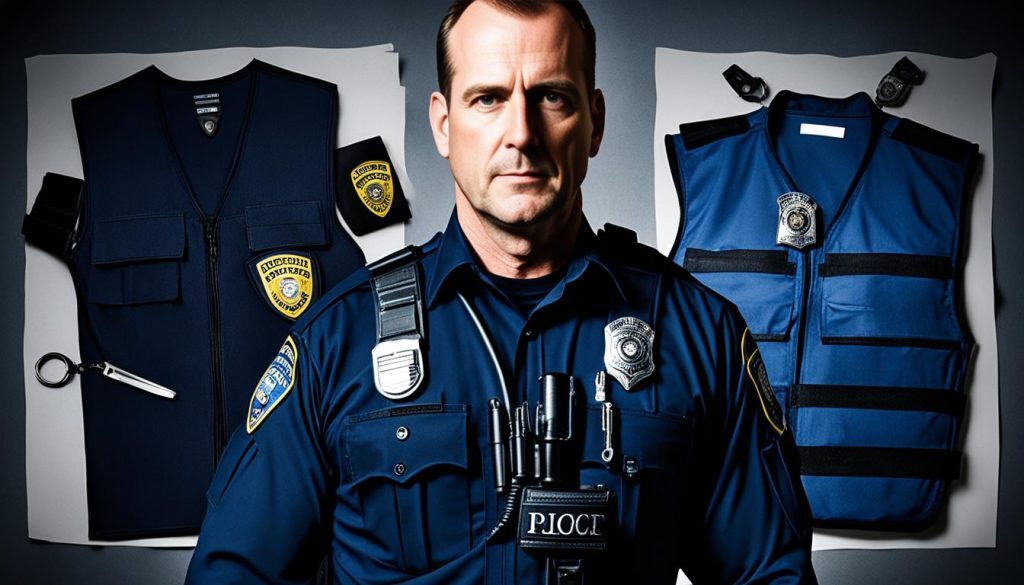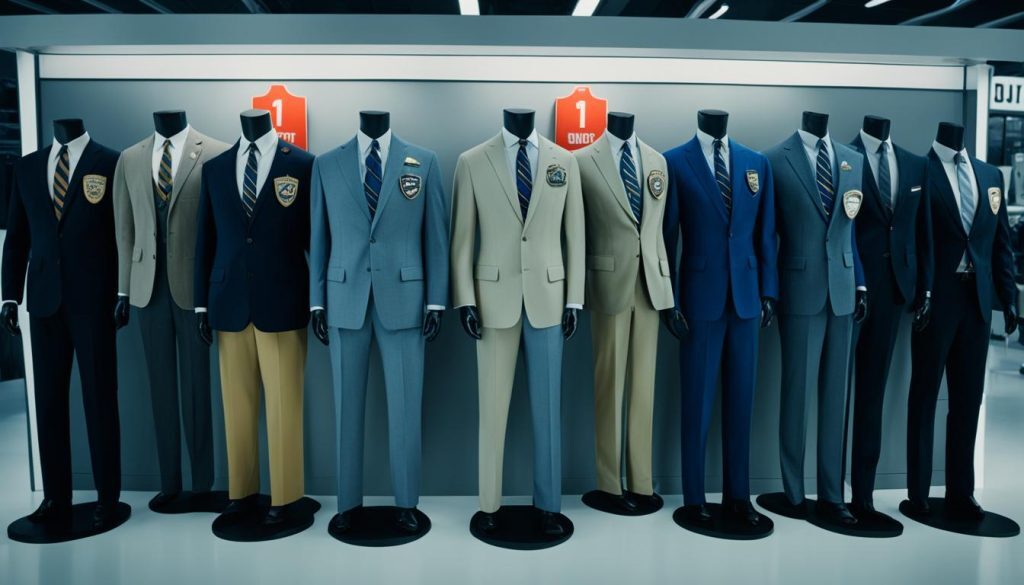Did you know that detectives, those stealthy investigators solving crimes and unraveling mysteries, also have a dress code to follow? Contrary to popular belief, their attire is not just limited to trench coats and fedora hats. The Toronto Police Service (TPS) has established specific uniform and appearance standards for detectives and other members of the police department, ensuring both compliance with legislation and maximum safety. Let’s take a closer look at the fascinating world of detective clothing norms and policy.
Key Takeaways:
- Detectives and other members of the police department are required to adhere to specific uniform and appearance standards according to the Toronto Police Service (TPS).
- Uniforms help establish a recognizable presence in the community and contribute to trust-building and authority.
- Detectives must have a valid license and clearly identify themselves as investigators without misrepresenting their role as law enforcement officers.
- There are exemptions to the license requirements for detectives, such as out-of-province bodyguards providing services to the film and television industry and certain licensed professionals.
- Detectives may be issued equipment like firearms and can use animals, specifically dogs, for tracking and detection purposes under certain conditions.
Importance of Uniforms for Recognizability and Safety
The role of uniforms in the law enforcement community, including detectives, goes beyond simply dictating what officers wear. They serve as a vital tool for establishing recognizability and ensuring the safety of both officers and the public they serve. The Toronto Police Service (TPS) emphasizes the significance of uniforms for detectives and other members of law enforcement, considering them an essential aspect of their professional image and authority.
One key reason for enforcing uniform standards is to create a recognizable presence in the community. When detectives don their police investigator clothing, it immediately signals to the public that they are law enforcement officers. The TPS proudly states that their uniform is not only easily recognized but also held in high regard by the community. This recognition fosters trust and respect, allowing detectives to effectively carry out their duties with the support and cooperation of the public.
Uniforms also play a crucial role in ensuring safety. By wearing the prescribed law enforcement dress code, detectives establish their authority and minimize confusion among individuals they interact with. When confronted with a law enforcement officer, the public can quickly identify them as such, eliminating any potential uncertainty or hesitation. This clear identification helps prevent situations where an officer’s authority might be questioned or unrecognized, reducing the likelihood of misunderstandings or confrontations.
The law enforcement dress code not only bolsters recognizability but also promotes the overall safety of both officers and the community. The TPS understands the importance of presenting a unified front and maintaining a professional appearance that instills confidence. This emphasis on uniformity helps establish a cohesive law enforcement presence, enhancing public safety by deterring criminal activities and promoting a sense of security.

By adhering to the investigator outfit requirements, detectives demonstrate their commitment to professionalism, accountability, and public trust. Through their distinct attire, they embody the values and responsibilities associated with being a member of the law enforcement community.
Licence and Misrepresentation Guidelines for Detectives
As a detective, it is crucial to understand the licence requirements and guidelines to avoid misrepresenting your role. Under the Private Security and Investigative Services Act, detectives, like other private investigators, must hold a valid licence.
When on duty, it is mandatory to carry your licence at all times and present it upon request. This ensures that you are in compliance with the law and can properly identify yourself as a licensed detective.
It is essential to note that detectives should not misrepresent or use titles such as “detective” or “private detective” that could imply they are law enforcement officers. This misrepresentation goes against regulations and can lead to fines or other legal consequences.
By adhering to the licence requirements and guidelines, you can maintain professionalism, uphold the integrity of the detective profession, and build trust with clients and the community.

- Carry your detective licence at all times while on duty.
- Present your licence upon request.
- Do not misrepresent yourself or use titles that imply you are a law enforcement officer.
- Comply with all regulations to avoid fines and legal consequences.
Exceptions to Licence Requirements for Detectives
While detectives are generally required to hold a valid licence under the Private Security and Investigative Services Act, there are certain exemptions to this requirement. These exemptions apply to specific individuals and circumstances, allowing them to perform detective roles without obtaining a licence.
Out-of-Province Bodyguard Services
Out-of-province bodyguards who provide services exclusively to the film and television industry are exempt from obtaining an Ontario licence, as long as they possess a valid licence from another jurisdiction. This exemption recognizes their expertise and allows them to contribute to the industry without unnecessary bureaucratic hurdles.
Licensed Professionals
In addition, certain licensed professionals are granted an exemption from obtaining a detective licence for their specific roles. These professionals include practicing barristers or solicitors, peace officers, insurance adjusters, and locksmiths. Their existing licences and certifications demonstrate their expertise in their respective fields, which overlap with detective duties in certain situations.
These exemptions ensure that individuals with specialized skills and qualifications can carry out detective-like activities without duplicating licensing requirements. It allows for the efficient utilization of licensed professionals while still maintaining the integrity and effectiveness of detective services.
Equipment and Dress Code for Detectives
As detectives carry out their investigative work, they may require specialized equipment to aid in their tasks. This includes items such as batons, handcuffs, and firearms. However, it is important to note that detectives can only carry firearms if they possess a valid firearms license and an Authorization to Carry, in accordance with federal law.
When armed detectives are on duty, they must always have their firearms license and Authorization to Carry with them. These documents serve as evidence that they are authorized to carry firearms and ensure compliance with legal requirements.
In addition to firearms and other related equipment, detectives also have the option to use animals to assist them in their investigations. Dogs, for example, are trained in tracking and detection and can be valuable assets in various scenarios. However, it is crucial that detectives using animals adhere to specific regulations and undergo proper training to ensure the safety and effectiveness of these partnerships.
In summary, detectives may be equipped with items like batons, handcuffs, and firearms if they meet the necessary licensing requirements. The use of animals, particularly dogs, can also be an essential resource in investigative work. However, it is imperative for detectives to comply with the relevant regulations and undergo appropriate training to maintain safety and professionalism in their operations.
Uniform Appearance for Detectives
When it comes to detective work, maintaining a professional appearance is crucial. Detectives are required to wear uniforms that adhere to specific standards to ensure their identification and representation. The outermost garment of the detective’s uniform must feature essential elements. On the front, there should be an identification tag displaying the detective’s full name or licence number, as well as the name, logo, or crest of the organization they work for. This helps establish their authority and makes them easily identifiable to the public they serve.
On the back of the uniform, the words “security” or “security guard” must be clearly visible. This further emphasizes the role of detectives and their commitment to maintaining safety and security. However, there are exceptions for detectives who are assigned to plain clothes duties or specialized roles such as loss prevention or theft protection. Even in these cases, detectives are still required to present their security guard licence upon request to verify their credentials.
Regular inspections are conducted to ensure that detectives comply with the uniform standards set in place. These inspections guarantee that detectives’ uniforms are in accordance with the prescribed guidelines, reinforcing professionalism and consistency within the law enforcement community. By maintaining uniform appearance, detectives can effectively carry out their duties and contribute to a safe and secure environment for all Canadians.